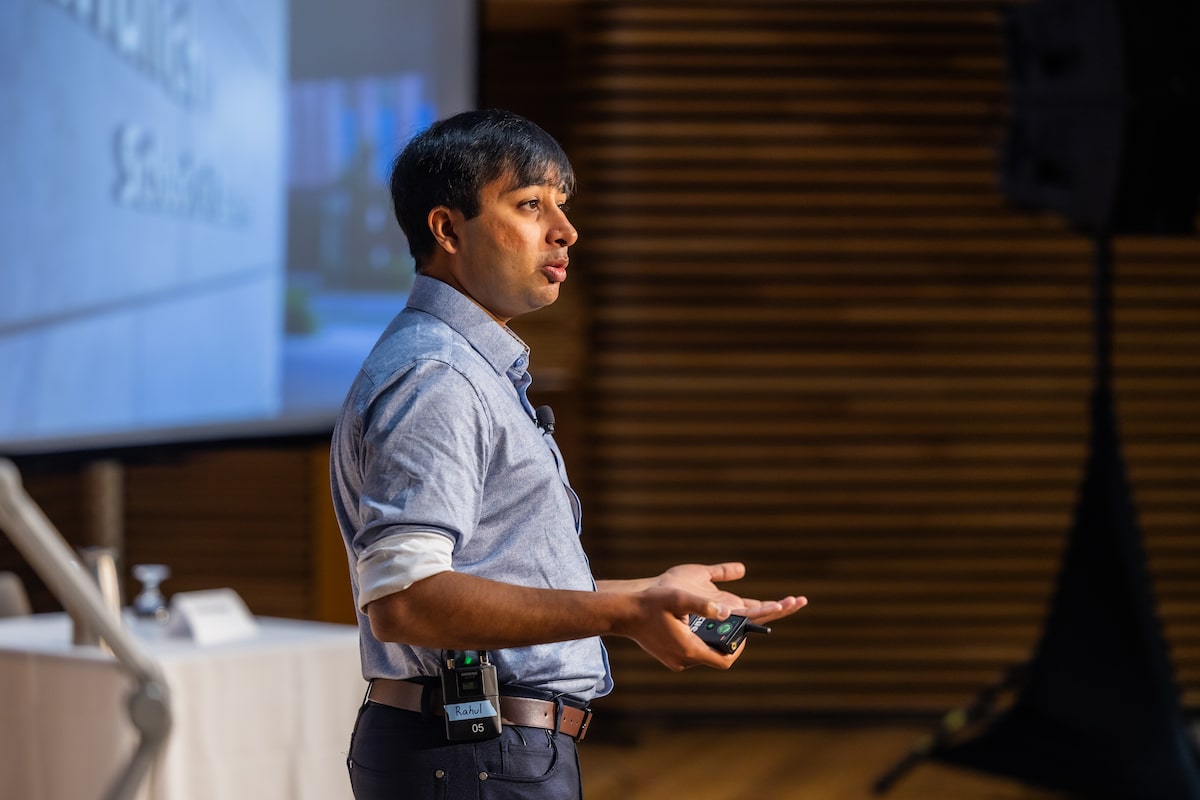Rahul Goel, CEO of NordSpace, gave a lecture at York University about how Canada should support dual-use defence technology.Eric Forget //Eric Forget
Rahul Goel dreamed of building a rocket company ever since he was a little kid, but it took years before he felt confident he had the skills and funds to make it a success in Canada.
Last week, before a crowd of students, investors, executives and government officials gathered at York University, Mr. Goel told the story of how he ended up founding that company, NordSpace. His presentation was part of a broader discussion about what Canada should be doing to fund innovation in defence.
Instead of diving headfirst into his rocket-related ambitions fresh out of the University of Toronto’s aerospace program, Mr. Goel decided to wait and make money through other unrelated ventures first. That way, he reasoned, his company’s success wouldn’t be dependent on anyone but himself.
In 2022, at the age of 30, he founded NordSpace and began building Canada’s first commercial space-launch capability to serve both military and civilian needs. Three years later, the private company is preparing to launch its first rocket into space without relying upon external capital to fuel its achievements.
Mr. Goel told a crowd of students, investors, executives and government officials that he built his company with $10-million of his own money and no reliance on external investors or government grants.Eric Forget //Eric Forget
“I did anything and everything I could to try and make enough money to start building that business out,” Mr. Goel told a mostly full lecture hall at York’s Schulich School of Business on Oct. 1.
His keynote address was followed by a debate-style panel, during which speakers lamented Canada’s inability to retain entrepreneurial talent and pitched ideas about how the government could better support companies that develop dual-use technologies suitable for both defence and civilian applications. The evening was co-hosted by the university and the Icebreaker, an innovation network for Canadian defence.
The fact that Mr. Goel built his company from the ground up, with $10-million of his own money to start and no reliance on external investors or government grants, is a point of pride for the 33-year-old chief executive officer.
But Sam Macdonald, co-founder of Deep Trekker Inc., which makes submersible remotely operated vehicles, said such stories are indicative of Canada’s broader lack of non-dilutive capital to support homegrown firms. (“Non-dilutive” means the funding doesn’t require a company to give up equity.)
“There is no reason in the world Rahul should be bootstrapping a rocket company. Absolutely not. It’s shameful that our government is not helping you in a more meaningful way,” she said during the panel discussion.
After starting her own company without relying upon external investors, Ms. Macdonald oversaw its acquisition in 2022 by Halma PLC, a British-based group of technology companies. She described shopping Deep Trekker around to potential buyers and receiving 10 letters of interest, eight of which were American. Only one was Canadian.
“The letter that we got from Canada was the lowest valuation of the company. So, guess where we didn’t sell to,” she said.
Ottawa launches Defence Investment Agency to streamline procurement
Defence and security make up first pillar of Canada’s foreign policy, Anand tells UN
Both Mr. Goel and Ms. Macdonald’s companies work in the dual-use technology ecosystem. And while their stories may serve as inspiration to the cohort of students and young entrepreneurs in the audience, they also come with caveats.
For example, Mr. Goel said, companies that are serious about being dual use need to think of it as more than just a label. Working in Canada’s defence sector requires various approvals such as security clearances or controlled goods authorization, and spending time in Ottawa to get to know the government as a customer, he said.
“This is intense, building a defence company. Dual-use is not just some switch that you flick,” he said.
These processes are the companies’ responsibility to seek out and complete. However, it’s also on the government and investors to make Canada an attractive place for firms to stay and build, said Mark Maybank, co-founder and managing partner at Maverix Private Equity.
“If Canada just follows its historic path of pouring money at the problem, picture it as a giant sieve, and all that money flowing straight out of Canada,” he said.
Tech founders leaving Canada at accelerating rate, survey finds
Creating a sovereign wealth fund is one way the federal government could strive to retain companies and the intellectual property they generate, Mr. Maybank said.
Such a fund would replace government grants and subsidies, and amalgamate Ottawa’s existing network of organizations into a single pool of capital with a clear, sovereign mandate.
Canada has fallen behind on multiple fronts in recent decades, but this is especially true for defence technology, Mr. Goel said. “When it comes to technology in the national interest, we’ve really underinvested to a point where it’s extremely hard to just get off the ground.”
Burkard Eberlein, a professor at the Schulich School, said during the panel that Ottawa should consider a strong dual-use technology sector as one of its fast-tracked nation-building projects.
“The nature of war is changing so rapidly, and we need very agile, nimble tech companies to actually provide the kind of tech that we need in this environment.”
